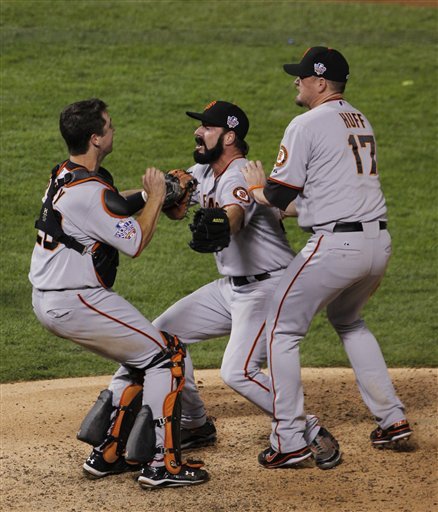
Posey, Wilson and Huff!
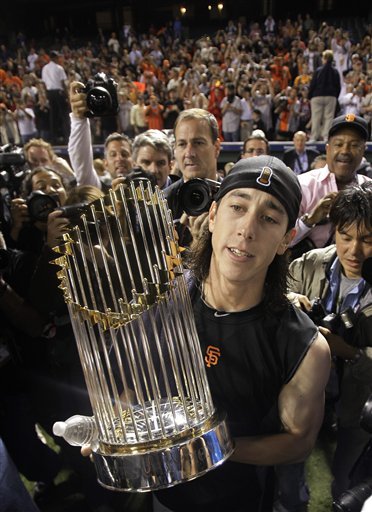

Posey
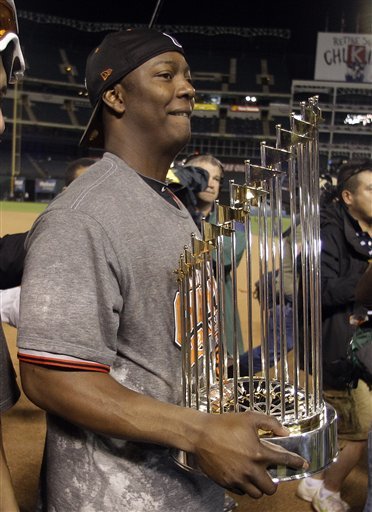

Posey & Baumgarner
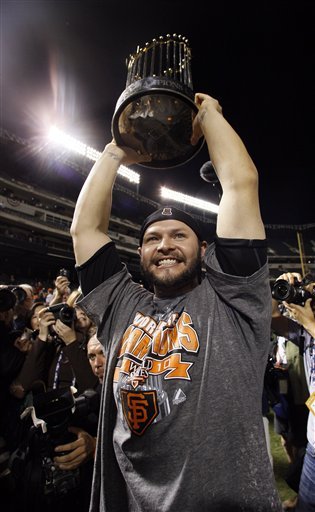






Cliff Lee got a big strikeout of Pat Burrell that put two outs on the board and stranded two runners on the base paths for the Giants.
But, with one swing of the bat, Edgar Renteria may have just put the icing on the cake for the San Francisco Giants. Not only that, but he may have just ended the World Series.
It's amazing what one pitch and one swing of the bat will do in a series. One mistake by a good pitcher will be taken advantage of by a good hitter.
That's exactly what happened as Renteria hammered a ball that kept carrying to left center. Enough to get over the wall to give the San Francisco Giants a 3-0 lead heading to the home half of the seventh.
Is there a comeback left in the Rangers or are they waiving the white flag.
Original article found here

ARLINGTON, Texas — Here's a nice story about Texas Rangers fans.
In the eighth inning of Sunday's Game 4, San Francisco Giants catcher Buster Posey(notes) became the youngest backstop since Johnny Bench in 1970 to hit a World Series home run. The blast came off a pitch from reliever Darren O'Day(notes) and the 23-year-old from Lee County, Ga., belted it into the grassy part of the batter's eye in center field. The ball attracted a scrum of running Rangers fans, even though the Rawlings was hit by a player in the wrong uniform. After a jump ball near the camera man (above), someone came away with the souvenir and that appeared to be that.
Only not quite. Somewhere between the homer and talking about the Giants' 4-0 win, Posey must have requested ownership of the ball with its special meaning. And the fan who caught it apparently complied because Andrew Baggarly of the San Jose Mercury News reported on Twitter that they coughed it up for a couple of autographed baseballs and a picture with the burgeoning star catcher. Here's his picture of the transaction.
Needless to say, after seeing stories like one fan holding out for $10K for Matt Carson's(notes) first homer or the Happy Youngster wanting a U-Haul worth of stuff for Chris Coghlan's(notes) debut dinger, it's nice to see this one resolved with a nice payoff for each side.
And with knowing how big of a star Posey might grow to be, I can't say that I would've been as agreeable to Posey's request for his souvenir back, even though it means a lot more to him than me.
So give yourself a hand, Texas fan. That was a very cool move.
Original article here

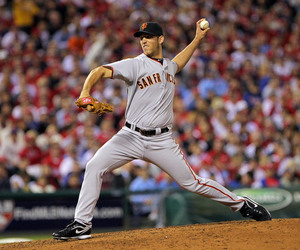
ARLINGTON, Texas – The rookie pitched way beyond his years, sending a shudder through Rangers Ballpark.
Madison Bumgarner dominated for eight innings, Aubrey Huff and Buster Posey homered and the San Francisco Giants put on a fielding clinic in Game 4, beating Texas 4-0 on Sunday night to move within one win of that elusive World Series title.
Dressed in black-and-orange, the Giants were spooky good in taking a 3-1 edge. Bumgarner allowed only three hits and took all the fun out of a festive, Halloween crowd.
Ace Tim Lincecum will try Monday night to deliver the Giants' first championship since they moved to San Francisco in 1958. Now it's up to Cliff Lee to save the Rangers' season in Game 5.
The 21-year-old Bumgarner and closer Brian Wilson helped the Giants become the first team to post two shutouts in a World Series since Baltimore threw three straight to close out the Dodgers in 1966.
Huff's two-run homer in the third gave Bumgarner all the support he needed. Posey added a solo shot in the eighth — Bumgarner and Posey became the first rookie battery to start in the Series since Spec Shea and Yogi Berra for the Yankees in 1947.
Original article found here




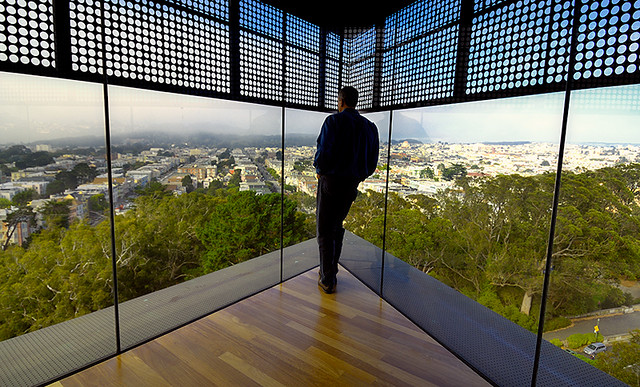


Enough with the doom and gloom about homeownership.
Sure, maybe there's more pain to come in the housing market. But when Time magazine starts running covers that declare "Owning a home may no longer make economic sense," it's time to say: Enough is enough. This is what "capitulation" looks like. Everyone has given up.
After all, at the peak of the bubble five years ago, Time had a different take. "Home Sweet Home," declared its cover then, as it celebrated the boom and asked: "Will your house make your rich?"But it's not enough just to be contrarian. So here are 10 reasons why it's good to buy a home.
1. You can get a good deal. Especially if you play hardball. This is a buyer's market. Most of the other buyers have now vanished, as the tax credits on purchases have just expired. We're four to five years into the biggest housing bust in modern history. And prices have come down a long way— about 30% from their peak, according to Standard & Poor's Case-Shiller Index, which tracks home prices in 20 big cities. Yes, it's mixed. New York is only down 20%. Arizona has halved. Will prices fall further? Sure, they could. You'll never catch the bottom. It doesn't really matter so much in the long haul.
Where is fair value? Fund manager Jeremy Grantham at GMO, who predicted the bust with remarkable accuracy, said two years ago that home prices needed to fall another 17% to reach fair value in relation to household incomes. Case-Shiller since then: Down 18%.
2. Mortgages are cheap. You can get a 30-year loan for around 4.3%. What's not to like? These are the lowest rates on record. As recently as two years ago they were about 6.3%. That drop slashes your monthly repayment by a fifth. If inflation picks up, you won't see these mortgage rates again in your lifetime. And if we get deflation, and rates fall further, you can refi.
3. You'll save on taxes. You can deduct the mortgage interest from your income taxes. You can deduct your real estate taxes. And you'll get a tax break on capital gains—if any—when you sell. Sure, you'll need to do your math. You'll only get the income tax break if you itemize your deductions, and many people may be better off taking the standard deduction instead. The breaks are more valuable the more you earn, and the bigger your mortgage. But many people will find that these tax breaks mean owning costs them less, often a lot less, than renting.
4. It'll be yours. You can have the kitchen and bathrooms you want. You can move the walls, build an extension—zoning permitted—or paint everything bright orange. Few landlords are so indulgent; for renters, these types of changes are often impossible. You'll feel better about your own place if you own it than if you rent. Many years ago, when I was working for a political campaign in England, I toured a working-class northern town. Mrs. Thatcher had just begun selling off public housing to the tenants. "You can tell the ones that have been bought," said my local guide. "They've painted the front door. It's the first thing people do when they buy." It was a small sign that said something big.
5. You'll get a better home. In many parts of the country it can be really hard to find a good rental. All the best places are sold as condos. Money talks. Once again, this is a case by case issue: In Miami right now there are so many vacant luxury condos that owners will rent them out for a fraction of the cost of owning. But few places are so favored. Generally speaking, if you want the best home in the best neighborhood, you're better off buying.
6. It offers some inflation protection. No, it's not perfect. But studies by Professor Karl "Chip" Case (of Case-Shiller), and others, suggest that over the long-term housing has tended to beat inflation by a couple of percentage points a year. That's valuable inflation insurance, especially if you're young and raising a family and thinking about the next 30 or 40 years. In the recent past, inflation-protected government bonds, or TIPS, offered an easier form of inflation insurance. But yields there have plummeted of late. That also makes homeownership look a little better by contrast.
7. It's risk capital. No, your home isn't the stock market and you shouldn't view it as the way to get rich. But if the economy does surprise us all and start booming, sooner or later real estate prices will head up again, too. One lesson from the last few years is that stocks are incredibly hard for most normal people to own in large quantities—for practical as well as psychological reasons. Equity in a home is another way of linking part of your portfolio to the long-term growth of the economy—if it happens—and still managing to sleep at night.
8. It's forced savings. If you can rent an apartment for $2,000 month instead of buying one for $2,400 a month, renting may make sense. But will you save that $400 for your future? A lot of people won't. Most, I dare say. Once again, you have to do your math, but the part of your mortgage payment that goes to principal repayment isn't a cost. You're just paying yourself by building equity. As a forced monthly saving, it's a good discipline.
9. There is a lot to choose from. There is a glut of homes in most of the country. The National Association of Realtors puts the current inventory at around 4 million homes. That's below last year's peak, but well above typical levels, and enough for about a year's worth of sales. More keeping coming onto the market, too, as the banks slowly unload their inventory of unsold properties. That means great choice, as well as great prices.
10. Sooner or later, the market will clear. Demand and supply will meet. The population is forecast to grow by more than 100 million people over the next 40 years. That means maybe 40 million new households looking for homes. Meanwhile, this housing glut will work itself out. Many of the homes will be bought. But many more will simply be destroyed—either deliberately, or by inaction. This is already happening. Even two years ago, when I toured the housing slump in western Florida, I saw bankrupt condo developments that were fast becoming derelict. And, finally, a lot of the "glut" simply won't matter: It's concentrated in a few areas, like Florida and Nevada. Unless you live there, the glut won't have any long-term impact on housing supply in your town.
Original article found here









